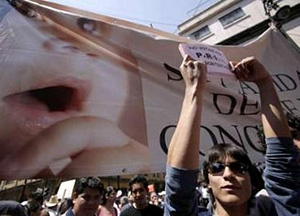 |
 |
 |
 News Around the Republic of Mexico | March 2007 News Around the Republic of Mexico | March 2007  
Anti-Abortion Debate Heats Up in Congress
 Ioan Grillo - Associated Press Ioan Grillo - Associated Press


| | Anti-abortion demonstrator protests outside Mexico City's local legislative assembly as law makers debate a law decriminalizing abortions up to 14 weeks of gestation in Mexico City. Mexico's Christian churches banded together on last week to fight a law that would legalize abortion in Mexico City, fearing it could spread quickly to the rest of the country. (Reuters/Andrew Winning) |
Mexico City – Leftist lawmakers sent Congress a bill to legalize abortion on Tuesday, the third such recent proposal in Mexico where the issue has divided the nation and drawn interest from the Vatican.

Under the bill filed in the lower house by the Democratic Revolution Party, or PRD, the second-largest force in Congress, women would be able to have an abortion within the first three months of pregnancy.

“We are in favor of women's life. We don't want women to stop their pregnancies... but we have a stubborn reality,” said Rep. Maricela Contreras.

PRD senators and legislators in Mexico City's assembly have both filed similar bills recently sparking virulent criticism from the Roman Catholic Church and conservative National Action Party of Felipe Calderón.

On Sunday, thousands of anti abortion activists marched through the capital led by Cardinal Norberto Rivera, Mexico's most prominent cleric.

The march followed an international anti-abortion conference featuring the Vatican's top anti-abortion campaigner Cardinal Alfonso Lopez Trujillo. While the church has always been against abortion, the Vatican especially does not want to lose its fight in Mexico, which has the second-largest Catholic population in the world.

Mexico's constitution ban religious groups from political activity and the PRD has called on the authorities to stop clerical involvement in the marches.

“We see (church officials) brandishing the sword in a tone of warm threatening and violating constitutional principal,” Contreras said.

However, officials in the Calderón administration have said the church is free to express its opinion.

The Mexican constitution also bars foreigners from political activism.

In 2000, authorities barred U.S. and Canadian anti-abortion activists from returning to Mexico for five years after they joined protests in Mexico City's main square.

The bill to legalize abortion is expected to easily pass in Mexico City, a leftist bastion where Democratic Revolution holds the mayorship and the majority of seats in the city legislature.

But it is expected to face a tough battle in Congress, where Calderón's party are the biggest force.

Most Latin American countries, including Mexico, allow abortion if the woman's life is in danger or in cases of rape or incest. In November, Nicaragua passed a law banning abortion in all cases. Cuba permits abortions within the first 12 weeks of pregnancy, as does the United States.

Wealthier Mexican women often travel to the United States for abortions, while thousands of poor women risk drinking potent herbal teas, taking pills or using other risky measures to abort illegally. | 
 | |
 |



